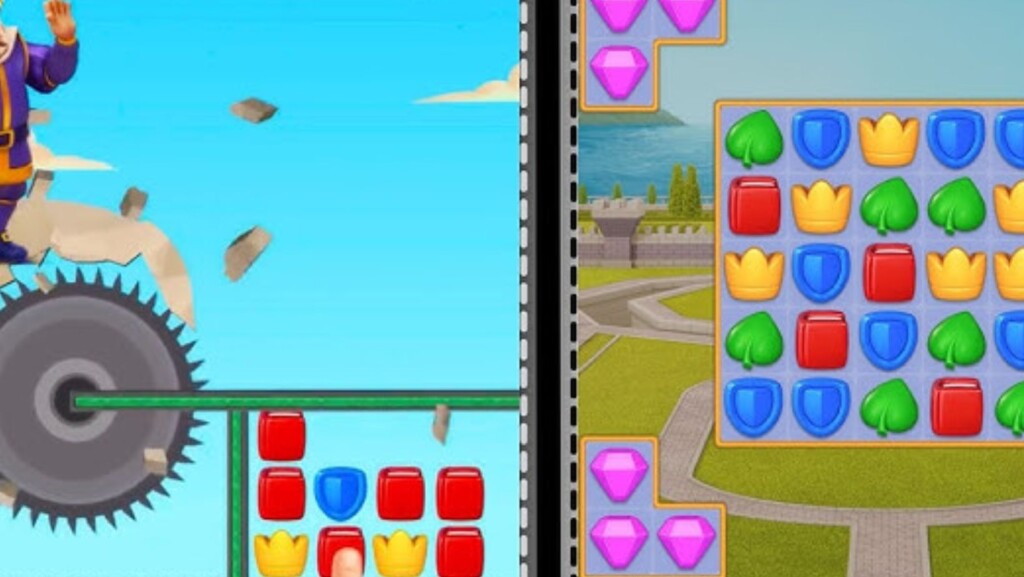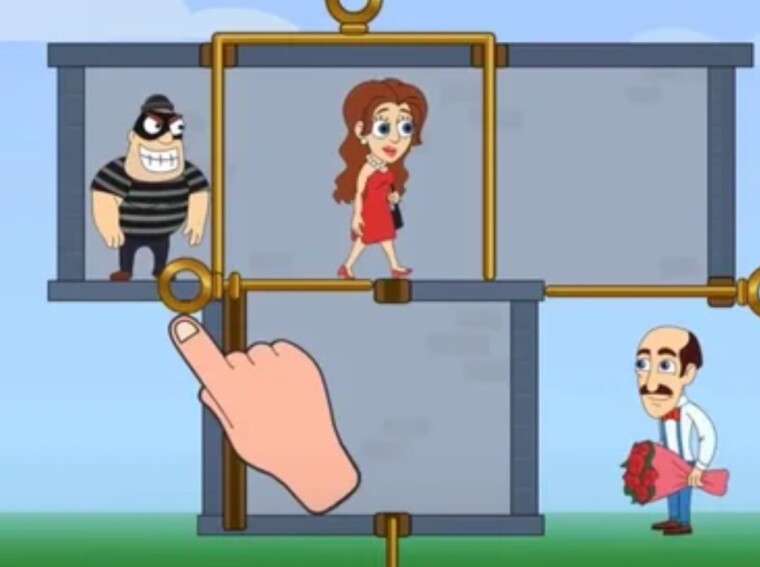You see an ad showing a puzzle game where you pull pins to rescue a character. You download it. The game is actually a crappy match-3. You got tricked.
This happens all the time. Three out of ten mobile game ads show fake gameplay that is not even in the game. More than half of all mobile gamers have seen ads that lie.
Publishers show pin-pulling puzzles, rescue missions, and story choices in ads. Players download expecting those features. They get match-3 games, city builders, or auto-playing idle games instead.
The Biggest Offenders
Homescapes runs ads showing pin-pull rescue puzzles. The game is a match-3 decorator. Hero Wars advertises battle puzzles where you drag units around. The actual game auto-plays battles while you watch. Project Makeover shows dramatic makeover stories in ads. Players get a basic match-3 game.
Royal Match has 55 million monthly players. Its ads show you saving King Robert from disasters. These “King’s Nightmare” levels exist in the game but appear rarely after dozens of regular match-3 levels.
Publishers exploit a legal gap. They bury the fake ad gameplay 20 levels deep as a mini-game. Because it technically exists in the app, they avoid false advertising charges. Some games show the ad gameplay once in the tutorial, then never again.
Why They Do It
Pin-pulling puzzles and rescue scenarios get downloads but don’t keep players long-term. These mechanics lack depth. Publishers need players who stick around and spend money, so they build match-3 or idle games instead. These formats extract more cash.
Mobile games chase whales. Industry data shows 50 to 80% of revenue comes from players who spend thousands of dollars. Publishers blast out fake ads to maximize downloads. If 90% of players quit immediately, the 10% who stay and pay make it worth it.
Publishers test dozens of fake ads at once. They track which ad gets the most downloads, kill the rest, then tweak the winner and test again. The ad that lies best wins.
Half of all app installs get deleted within 30 days. Fake ads drive many of these deletes. Games with fake ads get destroyed in reviews. When players mention the word “advertisement” or “fake” in reviews, they rate the game around 1 out of 5 stars. One in four bad reviews exists because someone felt tricked by the ad.
App Stores Barely Care
Google banned ads that misrepresent apps in August 2022. Violations can get apps removed. The UK banned Playrix ads in 2020 for showing pin-pull puzzles that weren’t in the game.
Enforcement is weak. Small studios automate ads using stolen templates. They spread ads across dozens of platforms, making individual violations hard to catch. Large publishers have lawyers. Small operations move fast and ignore rules.
One Type of App Skips the Lies
Mobile games use every casino trick in the book. Daily bonuses. Limited-time deals. Spinning wheels. Random prizes. They hook players with the same psychology casinos use. Then they hide all of it behind fake puzzle ads.
Funny enough, sweepstakes casino apps use the exact same engagement mechanics. Daily rewards. Prize wheels. The whole package. The difference? They show you casino games in the ad, and you get casino games in the app. No puzzles that turn into slot machines. No rescue missions that become match-3 grinders.
Sweepstakes apps tell you upfront what you’re downloading. You see slots, you get slots. You see card games, you get card games. The monetization, the gameplay, the whole experience matches what the ad showed. Players know they’re getting casino-style entertainment before they click download.
Regular mobile games play bait and switch. The ad shows a brain teaser. The app delivers a casino wrapped in cartoon graphics. Sweepstakes apps skip the lie and deliver what they advertised. When the only honest apps in mobile gaming are the ones openly running casino mechanics, the industry has a problem.
<iframe width=”560″ height=”315″ src=”https://www.youtube.com/embed/NhajAqI66nU?si=EivAYLzE4nrHq1cP” title=”YouTube video player” frameborder=”0″ allow=”accelerometer; autoplay; clipboard-write; encrypted-media; gyroscope; picture-in-picture; web-share” referrerpolicy=”strict-origin-when-cross-origin” allowfullscreen></iframe>
What People Say
Melissa Lertsmitivanta, Marketing Director at Supercell, said misleading ads create a race to the bottom. Andrew Susman from the Institute for Advertising Ethics called it manipulation. He noted designers assume everyone expects garbage, so they feel free to deliver garbage.
Japanese studio Monkeycraft made “Yeah! You Want ‘Those Games,’ Right? So Here You Go! Now, Let’s See You Clear Them!” for PC, Switch, and PlayStation. The game actually contains the mechanics mobile ads promise but never deliver. It’s not on mobile stores.

Reddit’s r/shittymobilegameads has 160,000 members tracking fake ads. Players spot the lies but keep downloading anyway.
The Money Works Out
Hero Wars produced over 1,000 fake ads. Most show gameplay that doesn’t exist. Evony: The King’s Return lets you play the ad gameplay for 30 minutes before forcing you into the real game. Lily’s Garden advertises drama and visual novel choices but delivers match-3 with minimal story.
Publishers accept terrible reviews and mass uninstalls as business costs. The few players who stay and drop thousands of dollars generate enough profit to cover everyone who left angry.
Mobile gaming runs on lies. Publishers show one game and deliver another. The only apps being honest are the ones openly running casino mechanics, which says everything about where the industry stands.

